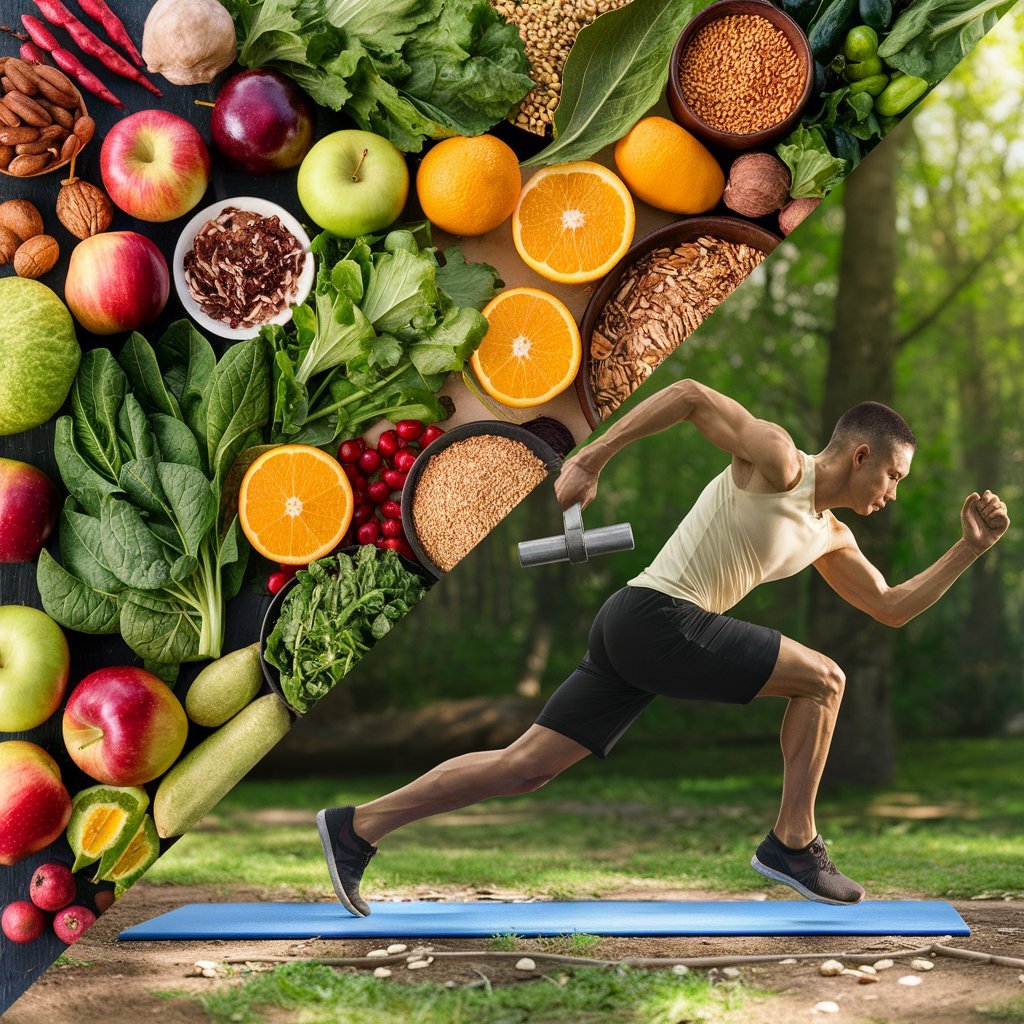Table of Contents
The Synergy of Nutrition & Exercise
The Link Between Nutrition and Exercise: A Comprehensive Guide
Understanding the symbiotic relationship between nutrition and exercise is pivotal for anyone aiming to maximize their health and fitness goals. This intricate connection not only fuels physical activity but also enhances recovery and performance. Proper nutrition provides the energy required for your workouts and helps repair and build muscle, making your exercise regimen more effective.
Energy and Performance: The body relies on the food we consume as its energy source. Carbohydrates, proteins, and fats play distinct roles in supporting physical activity. Carbohydrates are the primary fuel for both high-intensity workouts and endurance exercise. Proteins, on the other hand, are essential for the repair and growth of muscle tissue, particularly after strenuous exercise. Fats are also crucial, especially for longer-lasting, moderate-to-low-intensity activities.
Optimal Nutrition Timing: To maximize the benefits of nutrition in relation to exercise, timing is crucial. Consuming carbohydrates before exercising can boost performance and delay fatigue, while protein intake after a workout supports muscle recovery and growth. This strategic nutrient timing can significantly impact your fitness outcomes.
Hydration: Often overlooked, hydration plays a monumental role in the exercise-nutrition dynamic. Water is essential for maintaining optimal physical performance and, importantly, aids in the transportation of nutrients to the cells, ensuring that your body reaps the benefits of the nutrients you ingest.
Individual Needs: It’s important to recognize that nutritional needs can vary significantly from person to person, depending on factors like age, gender, fitness level, and the type and intensity of exercise. Therefore, crafting a nutrition plan that is tailored to your individual requirements is imperative for achieving the best results.
By understanding and implementing the principles of how nutrition and exercise influence each other, you can create a holistic approach to fitness that supports your body’s health and optimizes your performance. Remember, what you eat and when can be as important as your workout routine itself. Adopting a comprehensive strategy that includes both diet and physical activity can lead to greater fitness achievements and overall well-being.
Fueling Your Workouts: Pre-Exercise Nutrition
Optimizing your pre-exercise nutrition is crucial for maximizing your workout performance and ensuring your body has the necessary fuel to endure and recover. Understanding the right balance of carbohydrates, proteins, and fats, in addition to hydration, can make a significant difference in your fitness journey.
Carbohydrates are the primary fuel source for your body during high-intensity workouts. Consuming complex carbohydrates like whole grains, fruits, and vegetables a few hours before exercising provides a steady release of energy, keeping you powered throughout your session. For those looking for an immediate energy boost, simple carbohydrates such as banana or a piece of toast can be consumed closer to your workout time.
Proteins are essential not only for muscle repair but also for ensuring your muscles have the support they need during exercise. Including a moderate amount of protein in your pre-workout meal or snack can help to enhance muscle performance and prevent catabolism during prolonged activities. Foods like yogurt, nuts, or a smoothie with protein powder are great choices.
Fats should not be overlooked, as they are an important energy source for longer, less intense workouts. Including healthy fats such as avocados or nuts in your pre-workout nutrition can provide sustained energy for your muscles.
Hydration is another key aspect of pre-exercise nutrition. Starting your workout properly hydrated improves performance, prevents dehydration, and helps with recovery. Drinking water throughout the day prior to exercising and having a small amount of water or a sports drink right before starting can significantly impact your workout quality.
“A well-fueled body is a high-performing machine.”
To wrap up, an ideal pre-workout meal or snack combines complex carbohydrates for sustained energy, proteins for muscle support, and a small amount of healthy fats for longer-lasting fuel, all taken with sufficient hydration to maximize performance and recovery. Tailoring these components to suit your specific workout intensity and duration will help you achieve the best results from your exercise regimen.
Effective Post-Exercise Nutrition for Recovery
After an intense workout session, your body enters a recovery mode where it begins repairing muscle tissues and replenishing energy stores. This critical period is when effective post-exercise nutrition comes into play, significantly impacting your recovery and performance in future workouts.
Why Post-Exercise Nutrition is Crucial
Post-exercise nutrition serves two main purposes: to replenish glycogen stores and to increase muscle protein synthesis. Glycogen, stored in your muscles and liver, is your body’s preferred energy source during exercise. Consuming carbohydrates after working out replenishes these stores. Protein intake, on the other hand, aids in the repair and growth of muscle tissue. Together, carbohydrates and proteins accelerate recovery, enhance performance, and facilitate muscle growth.
Optimal Nutrients for Recovery
- Carbohydrates: Replenishing glycogen stores is crucial after exercise. Aiming for high-quality sources such as whole grains, fruits, and vegetables can provide your body with the necessary fuel. The recommendation is approximately 1.0-1.5 grams of carbohydrates per kilogram of body weight within 30 minutes after finishing your workout.
- Protein: Essential for muscle repair and growth, protein should not be overlooked. Consuming 20-40 grams of protein after your workout can significantly influence muscle recovery. High-quality protein sources include lean meats, dairy products, eggs, and plant-based proteins like beans and legumes.
- Hydration: Fluid loss occurs during exercise through sweat. Rehydrating after a workout is vital to recovery and performance. The goal should be to replenish any fluids lost during exercise. Water is usually enough for hydration, but in longer or more intense workouts, sports drinks can also help replace electrolytes.
“Remember, the timing of your post-workout meal is just as important as what you eat,” experts say. The anabolic window, a period of about 30 minutes to two hours post-exercise, is considered the optimal time frame for nutrient intake to maximize the benefits of your workout.
Incorporating a blend of carbohydrates, proteins, and sufficient hydration into your post-exercise routine can significantly boost recovery, ensuring you’re ready for your next workout session. Tailoring these recommendations to fit your individual needs and workout intensity will help optimize recovery and performance in the long run.
Balanced Diet: The Foundation of Wellness
A balanced diet is pivotal in laying the groundwork for optimal health and wellbeing. It encompasses a variety of foods needed to nourish the body and support its functioning. But what truly constitutes a balanced diet?
At the core, a balanced diet provides nutrients that are crucial for the body’s maintenance, repair, growth, and overall energy needs. These nutrients include proteins, carbohydrates, fats, vitamins, minerals, and water. Achieving harmony among these nutrients doesn’t just bolster physical health but also mental and emotional wellness.
Why is a Balanced Diet Essential?
The human body is an intricate system that requires a plethora of nutrients to function effectively. A diet that lacks essential nutrients can lead to a host of health issues, from fatigue and weakened immunity to chronic diseases like obesity, type 2 diabetes, and heart disease. Conversely, a well-rounded diet has been shown to improve longevity, enhance mental clarity, boost mood, and increase energy levels.
Key Components of a Balanced Diet
- Proteins: Vital for tissue repair and growth. Sources include poultry, fish, beans, and tofu.
- Carbohydrates: The body’s primary energy source. Opt for whole grains, fruits, and vegetables for a healthy intake.
- Fats: Essential for brain health and energy. Focus on healthy sources like avocados, nuts, and olive oil.
- Vitamins and Minerals: Important for preventing disease and maintaining bodily functions. A wide range of fruits and vegetables can cover most vitamin and mineral needs.
- Water: Often overlooked, but hydration is key for every cellular function.
Incorporating a variety of foods within these categories ensures that the body gets a broad spectrum of nutrients. This doesn’t mean striving for perfection in every meal but rather aiming for balance over time.
Remember, the goal of a balanced diet is not just to prevent illness but to foster an overall state of wellness. It’s about making choices that enhance your life, provide energy, prevent mood swings, and support your mental health. Small, consistent changes towards a more balanced diet can have profound effects on your health and wellbeing, laying a solid foundation for a vibrant, energetic life.
Maximizing Performance with Nutrient Timing
Nutrient timing is a crucial aspect of nutrition and exercise planning, aiming to optimize body composition and enhance athletic performance. It involves eating the right types of foods at the right times to improve recovery, fuel performance, and boost muscle synthesis.
Understanding the Window of Opportunity
The concept of the “window of opportunity” is paramount in nutrient timing. This refers to the critical periods before, during, and after a workout when your body is most receptive to nutrient absorption. For instance, consuming carbohydrates and proteins before exercise can not only provide the necessary energy but also prevent muscle catabolism. Following up with a post-workout meal rich in these nutrients can then aid in muscle recovery and growth.
Pre-Workout Nutrition
Fueling your body before exercising ensures you have the energy to perform at your peak. Focus on consuming a balanced meal of complex carbohydrates and lean protein 2 to 3 hours before your activity. This can help in sustaining energy, improving performance, and speeding up recovery time.
Intra-Workout Hydration
Hydrating with water or an electrolyte-rich drink during exercise is vital to replace the fluids lost through sweat. Staying hydrated helps maintain endurance and prevent the declines in concentration and coordination that dehydration can cause.
Post-Workout Recovery
The 30 to 45-minute window after exercising is when your body is most primed for recovery. Consuming a mixture of carbohydrates and proteins in this period greatly facilitates muscle repair and growth. For optimal recovery, aim for a 3:1 or 4:1 ratio of carbs to protein.
“Nutrient timing can significantly impact your performance and recovery. Tailoring your nutrition to your body’s needs before, during, and after exercise can lead to remarkable improvements in strength, endurance, and overall health.”
To maximize performance with nutrient timing, consider your specific goals, the intensity of your workouts, and your personal dietary preferences. With careful planning and strategic timing of your meals, you can significantly enhance your athletic performance and achieve your fitness objectives.
Staying Hydrated: The Key to Exercise Success
Hydration is arguably the most crucial factor in achieving and maintaining high performance during any form of exercise. Understanding the role of water in the body, and how it affects your fitness goals, is the first step toward unlocking your true athletic potential.
Water performs several critical functions in the body, including regulating body temperature, lubricating joints, and transporting nutrients that provide energy for performance. When you exercise, you lose water through sweat at a rate that can quickly lead to dehydration if not properly managed. This loss of fluid can lead to decreased performance, increased fatigue, and, in severe cases, heat stroke.
Hydration Tips for Optimal Exercise Performance:
- Before Exercise: Begin your workout well-hydrated. Drinking about 17-20 ounces of water two to three hours before exercising ensures your body starts off with adequate hydration.
- During Exercise: The goal here is to replace fluids lost through sweat. A good rule of thumb is to consume 7-10 ounces of water every 10-20 minutes during exercise, adjusting based on your sweat rate and the environmental conditions.
- After Exercise: Rehydrating after a workout is essential for recovery. Drink 16-24 ounces of water for every pound of body weight lost during exercise. Including electrolytes, like sodium and potassium, helps restore the body’s water-electrolyte balance.
“The human body can survive weeks without food, but only days without water. When it comes to exercise, the margin of difference between hydrated and dehydrated could be the gap between mediocrity and excellence.”
It’s also crucial to listen to your body—thirst is an early sign of dehydration. However, feeling thirsty means you’re already at a deficit, so aim to maintain hydration throughout the day, not just around your workouts.
By integrating these hydration strategies into your fitness regimen, you’re setting the stage not just for immediate success in your workouts but also for long-term health and performance. Remember, when it comes to exercise, water isn’t just a part of the equation—it’s the key to unlocking your potential.

Nutrition for Different Types of Exercise
Exercise is not a one-size-fits-all endeavor, and neither is nutrition. Different types of activities demand unique nutritional strategies to optimize performance and recovery. Understanding the key dietary requirements for various exercise regimes can significantly enhance your fitness journey.
Strength Training focuses on building muscle and strength, requiring ample protein to repair and grow muscle tissue. Lean meats, fish, dairy, legumes, and protein supplements serve as excellent protein sources. Additionally, adequate carbohydrates are essential for replenishing glycogen stores, which fuel your workouts. Whole-grain foods, fruits, and vegetables provide a healthy source of carbs.
Endurance Training, such as running or cycling, emphasizes the importance of carbohydrates as a primary energy source. Long-duration activities deplete glycogen reserves, making carb-loading a strategy for endurance athletes. Nonetheless, balancing carbs with proteins and fats is crucial for overall health and maintaining muscle mass.
High-Intensity Interval Training (HIIT) combines short bursts of intense activity with periods of rest or low activity. This type of exercise demands a balanced diet rich in carbohydrates, proteins, and healthy fats. It’s particularly important to consume a carbohydrate-rich snack or meal after a HIIT session to replenish glycogen stores and facilitate muscle recovery.
Hydration plays a pivotal role across all exercise types. Staying adequately hydrated before, during, and after exercise supports optimal performance and recovery. Electrolyte-replenishing beverages can be beneficial following prolonged or high-intensity workouts to replace lost salts.
Remember, nutrient timing also influences the effectiveness of your diet. Consuming protein and carbs within 30 minutes to an hour post-exercise maximizes muscle recovery and glycogen synthesis.
Lastly, dietary supplements can support various fitness goals but should not replace a balanced diet. Omega-3 fatty acids, branched-chain amino acids (BCAAs), and multivitamins are among the popular choices for athletes seeking an edge in their nutrition plan.
Crafting your nutrition plan around your specific exercise regime not only boosts performance but also aids in quicker recovery, ensuring you’re ready for your next workout session. Whether you’re lifting weights, running marathons, or engaging in high-powered intervals, tailoring your diet to your exercise needs is a game-changer in achieving your fitness goals.
The Role of Supplements in Exercise Nutrition
In the realm of fitness and health, supplements have carved out a significant role, effectively bridging the gap between an individual’s daily nutritional intake and the heightened requirements brought on by regular exercise. While food remains the cornerstone of any nutrition plan, the strategic use of supplements can enhance performance, recovery, and overall health outcomes for those engaged in consistent physical activity.
Why Supplements Matter
Exercise, particularly of high intensity or long duration, increases the body’s demand for specific nutrients that are sometimes hard to fully acquire through diet alone. This is where supplements step in, offering a convenient and efficient means to support the body’s needs, promote muscle repair, improve energy levels, and reduce recovery time.
Protein Powders: A quintessential supplement, protein powders such as whey or plant-based alternatives, support muscle repair and growth. After a strenuous workout, they provide the essential amino acids needed for muscle recovery and synthesis.
Creatine: Known for its effectiveness in high-intensity training, creatine enhances strength, increases lean muscle mass, and helps muscles recover more quickly during exercise. This translates into the ability to perform higher intensity workouts at a higher frequency.
BCAAs (Branched-Chain Amino Acids): These are critical for muscle recovery, helping to reduce muscle soreness and fatigue after exercise. By facilitating the repair process, BCAAs enable more consistent and intense training sessions.
Omega-3 Fatty Acids: Often found in fish oil supplements, omega-3s are praised for their anti-inflammatory properties, which are vital in speeding up recovery and enhancing joint health, making them particularly beneficial for endurance athletes.
Vitamins and Minerals: Key vitamins such as Vitamin D, Magnesium, and Iron play crucial roles in energy production, muscle recovery, and oxygen transport, respectively. Supplements can help correct deficiencies in these nutrients, which may impede performance and recovery.
In conclusion, while supplements should not replace whole foods, they can undoubtedly complement an athlete’s diet to meet the specific nutritional demands of regular exercise. Whether the goal is to increase muscle mass, enhance recovery, or simply ensure an adequate intake of essential nutrients, incorporating appropriate supplements can provide a strategic advantage in achieving fitness milestones. However, it is always advisable to consult with a healthcare provider or a nutritionist to tailor supplement intake to one’s individual needs and health conditions.


You must be logged in to post a comment.